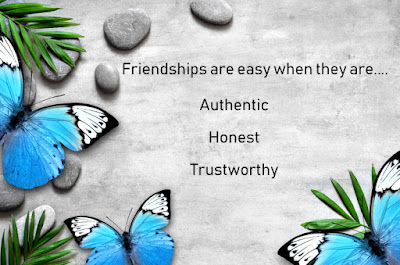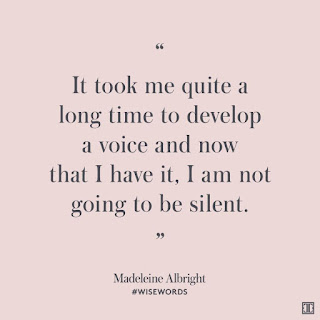Are My Friendships Healthy? 3 Qualities To Consider: #1 EASY
Friendships! What
would our lives be without them? We develop friendships in the most natural of
gatherings including our families, school, work, places of worship, service
organizations, community causes, and sports interests. In more
recent times, our network of friendships has grown exponentially as we connect
with individuals in our cyber lives. Friendships meet all kinds of needs and
serve us in all kinds of ways. Some are extremely important to us; others are
less so. With TV shows, media, and
social networking redefining friendship, it can be confusing as to what healthy
friendship is.
Friendship is a critical component of many relationships,
such as marriages or partnerships. However, for the purposes of this series, we are focusing on any close friends
currently in our lives. These are
friendships which may be relatively new or they may be longstanding. Either
way, we have chosen to invest ourselves, our time, and our resources into these
individuals who are important to us. And, as is true with other relationships in our lives, sometimes we stay
in friendships for the right reasons; sometimes we stay when it is unhealthy
for us to do so. As we do in other areas
of our well being, it is beneficial to take a step back and reassess whether our
friendships are healthy or not. And, how
do we know?
Let’s get started as we explore “Are My Friendships Healthy?
3 Qualities To Consider: Easy, Equal,
and Enriching”
Are my friendships EASY?
Easy? That doesn’t sound right? Aren’t strong friendships
supposed to be hard work? No, they are not. However, it order for our friendships
take on the quality of being easy, what they do require is a commitment to
identifying and integrating three essential characteristics.
First, easy comes with being authentic.
The word “authentic” is used quite frequently in our daily
lives. It is a word which captures our
attention because of its meaningful connotations. Within our friendships, we
are being authentic when we are true to our own personality, spirit, and
character. We are real with our friends; we don’t pretend to be something we
are not. And, perhaps most importantly,
in healthy easy friendships, it is safe
to be who we are. We are not fearful of
being judged, evaluated, or mischaracterized. Being authentic also means that
we do not have to “pretzel” ourselves in order to assuage the unhealthiness of
someone else or to compromise our own wellness.
In easy friendships, we are free to
be who we are.
A few weeks ago while waiting for an appointment, I struck
up a conversation with a very nice elderly man. He was so easy to talk with and
we seemed to connect on many levels. As I listened to the challenges he faced
growing up regarding his inability to be himself, to be authentic, I was in awe
of his extraordinarily positive mindset and purposeful direction in life. When
I asked him how that came to be, he responded, “Holli, when I turned
twenty-six, I made a decision that I would always seek out friendships in which
people were more intelligent than me, and more importantly, they were healthier
than me.” He paused. I listened. “That has served me well. I have
a happy and healthy life.”
While it is desirable to maintain authentic friendships, there
are circumstances which may require us to adopt a false or guarded persona in
order to navigate challenging friendships or unhealthy behavioral norms of
family members, work relations, or when we are in other social gatherings.These friendships are not easy; they require
us to develop a clear sense of their complexities and to implement boundaries
in order to safeguard our wellness while respecting and honoring ourselves in
the process.
However, more often than not, we have a choice about how we
want to spend time and with whom. It is up to each of us to minimize time
spent with individuals who expect us to conform to their unhealthiness while
jeopardizing our own. It is up to each of us to maximize our
opportunities to be who we are, to be real, and to be with others who welcome
us as we are.
Being authentic means
being our true selves.
Healthy friendships flourish
in the ease and acceptance of one another.
Secondly, easy comes with being honest.
Being honest is necessary in healthy easy friendships.
Honesty is based on two factors: truth
and transparency.
Friendships which are easy are based in sharing truth with
one another. It doesn’t mean we have to unveil every detail of our colorful
pasts or unravel our painful experiences with every friend. It doesn’t mean we
need to disclose anything which may violate or injure us in any way. It means
we have come to a place of peace and acceptance with ourselves about who we are
and how we came to be. It means that if
and when we choose to disclose what is important to us, we do so with
self-respect, self-regulation, and with self-regard.
In easy friendships, not only to do we share our truths but
we do so with transparency. There are no hidden agendas or underlying
motivations. We are clear, open, and genuine. Our attitudes, words, and actions are in alignment with who we say we are.
Several years ago, I belonged to a small authors group of
women. We met every month, gathering at one of our homes and sharing our
poetry, short stories, and essays. Aside from our common love of writing, we
bonded through our creations born out of times of sorrow, joy, youthful
escapades, family histories, and adventures in nature. Over the months and
years, we developed strong friendships rooted in honesty. We allowed ourselves
to become vulnerable with one another, witnessing how each woman’s stories were
based in truth and lived out through her legacy of transparency. Although we
were all very different, diverse, and independent women, our friendships
flourished in the ease of mutual honesty.
If we find ourselves in difficult friendships, there may be
a lack of honesty or self-awareness. Although there are many reasons for this, some
individuals develop strong defense mechanisms such as denial, anger, blame, or false narratives in order to cope with
challenges from their pasts. In attempts to assuage their pain, some folks
self-medicate with addictive behaviors, substances, or maladaptive patterns of
thinking, behaving, or feeling. This, in turn, serves as a foundation from
which they develop relationships, including friendships where they have
difficulty being honest, with themselves and with others.
It is important to be empathic and compassionate toward all
our friends, especially those who are struggling. At the same time, if we find
ourselves constantly defending our truths because of someone else’s lack of
awareness of their own, these friendships will not be easy. It is our
choice to cultivate friendships rooted in honesty.
Being honest means
being transparent about who we are.
Healthy friendships
are fueled by our truths and the ease in which they are shared.
Thirdly, easy comes with being trustworthy.
Lastly, in order for friendships to be easy, they must be
trustworthy. When we think of someone who is trustworthy, there are meaningful
words or phrases which come to mind such as loyalty, someone who has our back,
someone who can hold our secrets, individuals who are there when we need them,
and so on. However, for our purposes as it relates to friendships, our
definition is straightforward yet all-encompassing: trustworthy friends are individuals who can be counted on.
These
are individuals who are worthy of our
trust because they have proven it through their words and their actions. They
are considered loyal because their faithfulness has never been in question. These are
individuals who have our backs without talking behind them. These are friends who don’t give excuses for
not being available; they always show up. When we pause and think, "Who can I count on?", these friendships come to mind
immediately.
During my years as a public school teacher, I was fortunate
to teach hundreds of amazing kids. The last seven years of my career, I was
honored to teach high school juniors and
seniors in a class entitled “Theory of Knowledge.” An extremely rigorous course
based largely on Socratic discussion, the students were stretched in their
responsibilities to the curriculum and their other classes and activities.
There were days when I knew the students were burnt out trying their best to
keep up with all the demands. And yet, no matter what was going on, there was
always one student, David, who could be counted on to ignite our
discussions, take on a leading role in a play, or lend support to another
student. He had done so countless times so without reservation. He never said no. His word was
backed up by his actions. David was worthy my trust and of his classmates’.
If we find ourselves in friendships where we question the
reliability of others or we doubt the integrity of their attitudes, words or actions, we
will find ourselves working overtime in these difficult relationships. And, if we continue to invest into friendships
which are not worthy of our trust, we will not only be disappointed, but we may
sabotage our health in the process.
In our fast-paced social networking society today, we place
importance and value on how many friends, followers, and connections we have. Quantity of friendships has taken precedence
over the quality of them. Friendships are invited and then unfollowed with a
click of a key. Friends are encouraged and uplifted one moment; then torn down
the next. These cyber friendships can be confusing and isolating, especially
for young people growing up without a sense of real friendship based on face to
face connection and on trust established and earned over time. It is important
to remind ourselves that within our
repertoire of friends, both online and off, if we have one or two whom we know,
without a doubt we can count on, we are indeed fortunate. Let’s cherish them.
Being trustworthy
means being able to be counted on.
Healthy friendships flow
easily in a current of mutual trust.
In conclusion, take a few moments and reflect upon the
following questions. Then, respond to them by writing down your thoughts. There
are no right answers, only what is healthy for you.
1. Am I satisfied with the healthiness of my
friendships? Why or why not?
2. Do my friendships fall into the easy category? Which are authentic, honest, and trustworthy?Which are not?
3. Which one of the three qualities of being easy is most important to me in a
healthy friendship? Why?
4. What shifts or changes do I need to make in my friendships? How will I do this?
5. Do I consider myself a healthy easy friend to
others? Why or why not? What can I improve upon?
Next time, we will tackle “Are My Friendships Healthy? Are they Equal?”
Like us on Facebook
Follow us on Twitter



Comments
Post a Comment